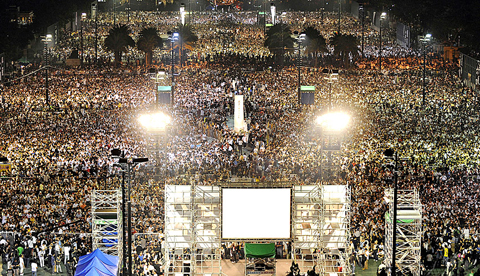China yesterday rejected calls for a probe into the Tiananmen Square Massacre, saying that the matter had been settled.
US Secretary of State Hillary Clinton appealed on Wednesday to China to openly examine “the darker events of its past” and provide a public account of those killed, detained or missing as a result of the violent crackdown, a day after the US House of Representatives passed a resolution urging Beijing to launch a probe into the incident.
“As for the political incident that took place in China and all related issues, our party and government have already come to a clear conclusion,” Chinese Foreign Ministry Spokesman Qin Gang (秦剛) told reporters at a regular briefing.

PHOTO: AFP
Asked whether the government would ever review its conclusion, Qin ignored the question.
Clinton’s strongly worded statement was likely to win praise from human rights activists, who were bitterly disappointed at her failure to press for human rights during a visit to Beijing earlier this year.
The statement could signal a tougher line from the administration of US President Barack Obama, which does not want a dialogue on human rights to interfere with talks on trade, climate change and North Korea.
In her statement, Clinton referred to “the tragic loss of hundreds of innocent lives” when hundreds of thousands of protesters took to the streets in Beijing and around the country to “demand basic rights denied to them.”
“A China that has made enormous progress economically, and that is emerging to take its rightful place in global leadership, should examine openly the darker events of its past … both to learn and to heal,” she said, calling on China to “release from prison all those still serving sentences in connection with the events surrounding June 4, 1989.”
“China can honor the memory of that day by moving to give the rule of law, protection of internationally-recognized human rights, and democratic development the same priority as it has given to economic reform,” she said.
In Washington, a series of events were scheduled to commemorate the anniversary, including a rally on the West Lawn of the Capitol and another in the Rayburn House Office Building of the Capitol complex, at which Yu Zhijian (??, Lu Decheng (魯德成) and Yu Dongyue (??, known as the “three heroes of Tiananmen,” were scheduled to appear.
The three were to be reunited for the first time since being released from prison and fleeing China.
House Speaker Nancy Pelosi was scheduled to lead the rally and said the “three heroes” would speak about their years spent in laogai, or gulags, for defacing a large portrait of Mao Zedong (毛澤東).

MAKING WAVES: China’s maritime militia could become a nontraditional threat in war, clogging up shipping lanes to prevent US or Japanese intervention, a report said About 1,900 Chinese ships flying flags of convenience and fishing vessels that participated in China’s military exercises around Taiwan last month and in January last year have been listed for monitoring, Coast Guard Administration (CGA) Deputy Director-General Hsieh Ching-chin (謝慶欽) said yesterday. Following amendments to the Commercial Port Act (商港法) and the Law of Ships (船舶法) last month, the CGA can designate possible berthing areas or deny ports of call for vessels suspected of loitering around areas where undersea cables can be accessed, Oceans Affairs Council Minister Kuan Bi-ling (管碧玲) said. The list of suspected ships, originally 300, had risen to about

DAREDEVIL: Honnold said it had always been a dream of his to climb Taipei 101, while a Netflix producer said the skyscraper was ‘a real icon of this country’ US climber Alex Honnold yesterday took on Taiwan’s tallest building, becoming the first person to scale Taipei 101 without a rope, harness or safety net. Hundreds of spectators gathered at the base of the 101-story skyscraper to watch Honnold, 40, embark on his daredevil feat, which was also broadcast live on Netflix. Dressed in a red T-shirt and yellow custom-made climbing shoes, Honnold swiftly moved up the southeast face of the glass and steel building. At one point, he stepped onto a platform midway up to wave down at fans and onlookers who were taking photos. People watching from inside

Japan’s strategic alliance with the US would collapse if Tokyo were to turn away from a conflict in Taiwan, Japanese Prime Minister Sanae Takaichi said yesterday, but distanced herself from previous comments that suggested a possible military response in such an event. Takaichi expressed her latest views on a nationally broadcast TV program late on Monday, where an opposition party leader criticized her for igniting tensions with China with the earlier remarks. Ties between Japan and China have sunk to the worst level in years after Takaichi said in November that a hypothetical Chinese attack on Taiwan could bring about a Japanese

STREAMLINED: The dedicated funding would allow the US to transfer equipment to Taiwan when needed and order upgraded replacements for stockpiles, a source said The US House of Representatives on Thursday passed a defense appropriations bill totaling US$838.7 billion, of which US$1 billion is to be allocated to reinforcing security cooperation with Taiwan and US$150 million to replace defense articles provided to the nation. These are part of the Consolidated Appropriation Act, which the US House yesterday passed with 341 votes in favor and 88 against. The act must be passed by the US Senate before Friday next week to avoid another government shutdown. The US House Committee on Appropriations on Monday unveiled the act, saying that it allocates US$1 billion for the Taiwan Security Cooperation Initiative